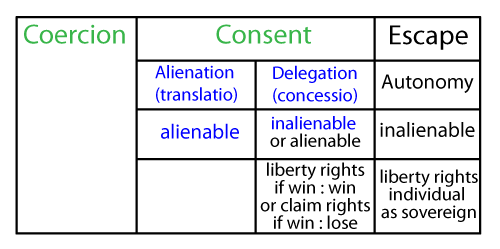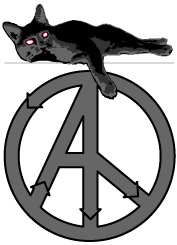The purpose of this site is to reverse the panopticon, and “block the chains” of authority and vanguardism by serving as a repository for past and present realities, ideas, and commentary surrounding left-libertarian or anarchist/anti-capitalist political economy and governance. Or if you like, a space for radical liberalism, or as Bobby Seale of the Black Panthers promoted, Revolutionary Humanism.
This site shares the spectacle through the posted author’s vision, with a lean towards writings that are libertarian and/or socialist in nature. Most of the content is anti-authoritarian or anarchist so it tends to promote the equality of power or the elimination of hierarchy, a space of “all power to all people” (Black Panther slogan), which is the same as no power for anyone, which translates to blocking the chains of authority. Equaliberty.
How much credence should we give to Nietzsche, or to the last lines of The Will to Power when thinking about power and freedom?
. . . –do you want a name for this world? A solution for all its riddles? A light for you, too, you best-concealed, strongest, most intrepid, most midnightly men?–This world is the will to power–and nothing besides! And you yourselves are also this will to power–and nothing besides!
Perhaps it is the will of the individual to find sovereignty, to escape Biopower. At any rate, somehow anarchy (without archy (rulers or government)) has come to be associated with chaos or no order. People often confuse, or are led to believe via repetition, that anarch-y is anarch-ism. Somehow a vacuum in power, if not it’s death, is seen as a powerful mess of chaos. Can we separate power from authority or an Authority, the body politic’s sense of impending chaos from the absence of power and demagogues? Of course the word “anarchy” itself is “negative” as “an” means “not” or “without,” but will anti-authoritarianism and disestablishmentarianism always result in negative outcomes? Of course not. Anarchists are not against “governance,” and it is not as if power will be drawn down to zero, just bureaucratic top-down State/Government power. Libertarianism is more positive in tone than “anarchism” in that liberty is autonomy or freedom, but what is anarchism if not exactly libertarianism, and perhaps anti-politics?

Ellerman pointed to the Forest (green) and the Trees (blue) as the current classical liberal framing, but primarily missing the trees. The framing can be expanded or re-framed to consider the black text, perhaps the oxygen of the forest. more on “rights”
This is my doctrine: Give every other human being every right you claim for yourself. The Liberty Of Man, Woman And Child
Before the 1970s birthed pro-state and minarchist strands of “right” libertarians (including the Libertarian Party) libertarianism had no left or right prefix. Until then, since the 1850s libertarianism had been synonymous with “anarchism” (see 150 years of Libertarian, and recently 160 years), and arose in part because anarchists needed another label because they were being persecuted.
Is it worth fighting to keep the name “libertarian” for its original purveyors? At this juncture anarchism is still a bad word for many, but it’s slowly becoming more acceptable, much like the word “atheism,” or “vegan” for that matter, which aren’t quite as taboo as they were only a decade ago. However, the media (or how the media portrays) black bloc, crimethInc, and antifa may do more harm than good when it comes to public perceptions. Regardless, since the 70’s the co-opted libertarian designation has needed a prefix to distinguish left from right, or just what someone means when they say “libertarian.” The right-libs typically embrace laissez-faire “capitalism” and politics/government (albeit minimal), but the original or “real” libertarians embrace the anarcho-socialist tradition. What else could we call right-libertarians? Republitarians? Rightarians? (Ayn) Randians? Aynians? Randroids? Minarchists? Voluntaryists? The Alt-Lib Party?
This site and many others continue to use “libertarianism” to refer to anarchism because of the the name-game situation we have found ourselves in, where up is down and down is up. It is a game some of us feel should not exist. Why should “real” libertarians (anarchists/left libertarians) cede? It’s not that left and right libertarians don’t have anything in common, as “every difference of opinion is not a difference in principle” (Thomas Jefferson). However, some details and core principles are certainly at odds, and ceding 160 years of history is hard to swallow. It’s not clear that any of this is important really. Anarchism, libertarianism, or radical liberalism if you like, can all be the same really…if we establish what me mean. Or if we say “anarchist without adjectives” or libertarian without adjectives we can cut to the crux of breaking the chains of authority and its bedfellows.

“Liberty is the mother, not the daughter, of order” — Pierre-Joseph Proudhon
►The ideas expressed in posts, pages, and comments are the sole responsibility of their author, not this site or its associates.
►Bias? of course, but as seen, both sides or multiple interpretations are housed here (mostly within the confines of the bias of course). Make your own thesis and anti-thesis to synthesize something new as a way to seek “human relations beyond and outside of any notions of practicing “superiority” over others for whatever political-social exploitative purposes or beliefs.” Bobby Seale

David Graeber and J. K. Gibson-Graham, like Marcel Mauss, contend that we encounter a mixed-economy with individualistic and communistic elements. The latter happens frequently as we often encounter the communist mantra in our daily lives: “from each according to their ability, to each according to their needs.” Graeber argues that we experience “individualistic-communism” (here and here). Is a mixed-economy or libertarian-socialism/communism with markets possible? Mutualism and beyond perhaps? Autonomism?
It’s hard to say what an anarchist society “will” look like, as that seems as impossible as determining the trajectory and outcome of the current ‘order’ and disorder unfolding from governments. This site houses some ideas on what it “might” look like (or not look like e.g. democratic failure).
Something else Graeber alludes to in Fragments of an Anarchist Anthropology is central to libertarianism and this site:
Even more than High Theory, what anarchism needs is what might be called Low Theory: a way to grappling with those real, immediate questions that emerge from a transformative project…normally in mainstream social science this sort of thing is generally classified as “policy issues,” and no self respecting anarchist would have anything to do with these.
against policy (a tiny manifesto):
The notion of “policy” presumes a state or governing apparatus which imposes its will on others. “Policy” is the negation of politics; policy is by definition something concocted by some form of elite, which presumes it knows better than others how their affairs are to be conducted. By participating in policy debates the very best one can achieve is to limit the damage, since the very premise is inimical to the idea of people managing their own affairs. (p.9)
…What sort of social theory would actually be of interest to those who are trying to help bring about a world in which people are trying to govern their own affairs?…First,…”another world is possible.” (p.10)…The second, …reject self-consciously any trace of vanguardism. David Graeber
What is policy if not vanguardism? Suffice it to say that I think these are valid claims, and not much different than what many anarchists have set out to do or ask for.
“Block the Chains” (blockthechains/libertarianous) was inspired by block chain technology, and in a way block chain does, or can, block the chains of vanguardism.
The idea behind “proof of work,” according to Daniel Krawisz, of the Satoshi Nakamoto Institute, is that it is “an added complication, like a ritual, so as to make blocks more difficult to generate…. [It] is…a means for a group of self-interested people, none of whom is subordinate to any other, to establish a consensus against a considerable incentive to resist it.” Because it takes so much computing power to find this number, miners are motivated to ensure that the transactions they are processing are valid and non-conflicting.
This is a beautiful thing, and similar to “all power to all people” where we operate with no central authority. “One cannot protect society from coercion, theft and murder by institutionalizing and legalizing coercion, theft and murder . . . and renaming them “law,” “taxes,” and “war.” Larken Rose
Anarchy is Order, like a fractal in Chaos Theory, Order generated from the ‘Chaos’ of the many paths crossing to seek Order. If the paths are libertarian in nature they will shed minimal turbulence to disturb others, and find order via liberty if they have also shed the fetters of Authority in their wake. Anarchism is more process and ethic than final solutions to land a monopoly in control of process and the outlook. The solution is in an evolution around moving forward as needed to preserve a better world with liberty and justice in tow.
“Anarchism, to me, means not only the denial of authority, not only a new economy, but a revision of the principles of morality. It means the development of the individual as well as the assertion of the individual. It means self-responsibility, and not leader worship.” —Voltairine de Cleyre
“The real revolution is the enlightenment of the mind and the improvement of character. The only real emancipation is individual…” —Will Durant
“There is nothing intrinsically wrong about utopias, the problem is if you just have one of them, we need as many utopian visions as possible…” David Graeber
Good luck on your journey. Leave us some bread crumbs in your wake.
Part of the “purpose” beyond the above is to start to (or continue to) develop and answer these questions:
- Do we need to explain “every” human action and propagation of ideas/memes based on biological and ideological drives to success or longevity?
- Is it appropriate to frame some of this from an egoist pov where doing good makes you feel good, and this alone explains (some) interactions?
- Are selfishness and individuality a snap-shot like marginal-theory, whereas social selection theory is the long-run big picture like labor-theory, both complementary and inseparable?
- How does the Labor Theory of Property fit in?
- Do these questions or the question of altruism’s evolution (or existence) even need to be answered? Can they be answered?

►Some commentary, typically from the admin or not the original source, is signified with a cat silhouette. In addition, the cats sometimes have something to say. On a desktop or laptop you can see a message if you hover over it with the mouse arrow. On a phone or tablet without a mouse you have to hold your finger on the image as if you want to save it to see the message. The cats usually offer a Yodaism or something unique pertaining to the post. This is not an endorsement of animal domestication, pets, or Yoda-like speech. Not all posts and pages have them, but this began late in site’s history. It is slowly proliferating to pages and posts throughout the site.





This post started this site.
–
Really?

Did you really have to add “ous” to libertarian?
- The site needed a name and they aren’t easy to come by these days so “libertarianous” it is.
- The taglines “Block the chains” is inspired by Satoshi Nakamoto, and “all power to all people” by the Black Panthers.
- Before the 1970s birthed pro-state and minarchist strands of “right” libertarians (including the Libertarian Party) libertarianism had no left or right prefix. Until then, since the 1850s libertarianism had been synonymous with “anarchism” (see 150 years of Libertarian, and recently 160).
- “Ous” makes a statement about the name-game situation of “real” libertarians (anarchists/left libertarians) vs. right-wing libertarians (and The Libertarian Party), not to mention voluntarism. The co-opted libertarian designation now needs a prefix to distinguish left from right, or just what someone means when they say “libertarian.” The right-libs typically embrace (laissez-faire) “capitalism” (or capitulatism as some like to call it) and politics/government (albeit minimal), but real libertarians embrace the anarcho-socialist tradition. Perhaps this strain is “more” libertarian, or like the original sort, so “ous” is indeed appropriate.
- In essence, adding ous is like adding left in front of libertarian in that it is an attempt to be descriptive. The term “right-wing libertarian” is an oxymoron like the term anarcho-capitalism (depending on how you define capitalism).
- It seems the right and left prefix for libertarianism is here to stay, for now. Perhaps we can change that. The right and left strands do share a few ideals, but what’s proper? Who is real? Will “the real Slim Shady please stand up?” Or should I say Thin Shady?
- Using “ous” is not meant to be a play of the “one-drop” libertarian card as the left/right prefix will suffice to separate the wheat from the chaff.
- Some would argue that NAP and self-ownership are the crux of libertarianism, but this is questionable. If anarchism flourished would NAP and self-ownership (and “voluntaryism” for that matter) be rendered meaningless? Should ‘libertarians’ ascribe to the non-aggression principle/NAP? To the point of being vegan? Is it NA as P, or NA on P. Is this an axiom, or a branch on the tree trunk which is anarchism (to tweak a phrase from David Schmidtz). Like NAP, the idea of “self-ownership” is quite contentious. Self-ownership is not a valid principle, and NAP is close behind, as it’s dictum isn’t necessarily self-evident.
- Why libertarianism? Because self-ownership and NAP aside, libertarianism is the means and ends to real freedom of thought and action, i.e. liberty, not the window dressing of many democracies, but freedom from the bondage of monopolies in power, whether they be at home, the workplace, among friends, or under the umbrella of the State. In other words, freedom as choice, not a right granted, and freedom as anti-capitalism to escape theft (interest, rent, and profit).
- It’s as if libertarianism has birthed a schism of sorts. It’s not as if we need to add another name to the long list of redundant and hyphenated anarcho-adjectives, but for now I suppose right and left is where we are.
- Not far removed from schisms are reason and Rationalism, as in the “philosophical” sense of reasoning, as well as the “political” sense. Both are relevant to libertarianism/anarchism. Although, just what is “rational” is not apparent if we play the post structural card, though I’m not sure post structuralism is a valid, or coherent, world view. Somewhat related, post anarchism is a focus of this site.
- What exactly is implied by “egalitarian” varies among libertarians. My view: egalitarianism is not the economic sense of equal pay or rewards for all, but equal access to “power.” Not Power, as in Hierarchy/Authority, but equal power in a person’s (or animal’s) freedom of choice in making decisions (economic or other), and equal power to bypass suffering the consequences or collateral damage of the choices made by others. The difference in needs and abilities of people and non-human animals is real, and not very egalitarian, but how we act and address those differences can make a world of difference in just how ‘egalitarian’ society becomes. Respecting the sovereignty of all quickly levels the playing field of ‘power’ and will go a long way to ensuring the best of all possible worlds despite our differences.
- I’m not a big fan of logos, thanks to Naomi Klien, but the anarchy/peace/arrow logo (above) and the anarcho-fractals represent One vision– Anarchy as Order– with many paths to that “end” (the different arrows, or the multiple A/O symbols) — both individualist and collectivist. In this way, the order is derived from the chaos of many paths, paths with beginning/Alpha/A and end/Omega/O, built from A and O, and and perhaps “without origin” or end as well (ἀρχός archos, ruler, is related to αρχή arkhē, “beginning, origin”). Are rulers the end of beginnings?
